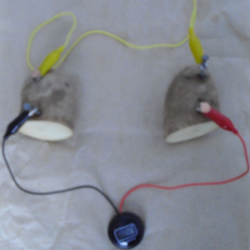Source Institutions
Source Institutions
Add to list Go to activity
Activity link broken? See if it's at the internet archive

In this electrochemistry activity, young learners and adult helpers create a battery from a potato to run a clock. This resource includes background information about electricity, electronics, and chemical reactions. Learners can also test this experiment with other fruits and vegetables in place of the potato. This activity was written to be part of a kit that could be checked out of a library, though the kit is not required.
- 10 to 30 minutes
- 10 to 30 minutes
- $5 - $10 per student
- Ages 4 - 8
- Activity, Experiment/Lab Activity
- English
Quick Guide
Materials List (per student)
- Simple stick on clock with red and black leads soldered onto the + and – terminals
- Battery to run clock
- Wire with alligator clips
- 2 copper coated nails
- 2 zinc coated nails
- Potato and other potential fruit or vegetables to test
Subjects
-
Engineering and Technology
-
Engineering
- Electrical Engineering
- Technology
-
Engineering
-
Physical Sciences
-
Electricity and Magnetism
- Electric Charges and Currents
- Electric Circuits
- Energy
-
Chemistry
- Chemical Reactions
- Oxidation-Reduction Reactions
-
Structure and Properties of Matter
- Atomic Structure
- Elementary Particles and Nuclear Physics
-
Electricity and Magnetism
-
Life Sciences
-
Diversity of Life
- Plants
-
Diversity of Life
-
The Nature of Science
-
The Scientific Process
- Conducting Investigations
-
The Scientific Process
Informal Categories
- Electronics
- Food and Cooking
Audience
To use this activity, learners need to:
- see
- see color
- read
- touch
Learning styles supported:
- Uses STEM to solve real-world problems
- Involves hands-on or lab activities
Other
Components that are part of this resource:
This resource is part of:
Access Rights:
- Free access
By:
- Shaw, Maisie ; Gomez, Maria
Rights:
- All rights reserved, Passport to Chemistry Adventure Program, Mount Holyoke College, 2010
Funding Source:
- Camille and Henry Dreyfus Foundation, Inc.
